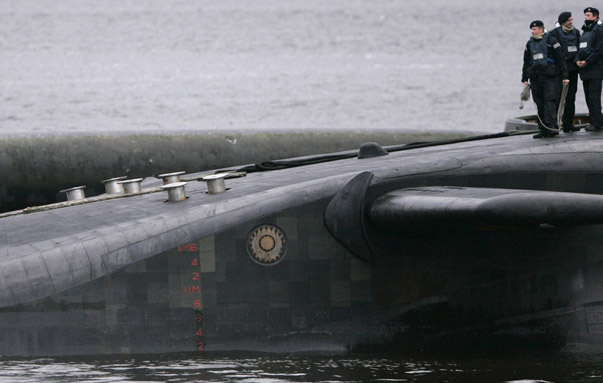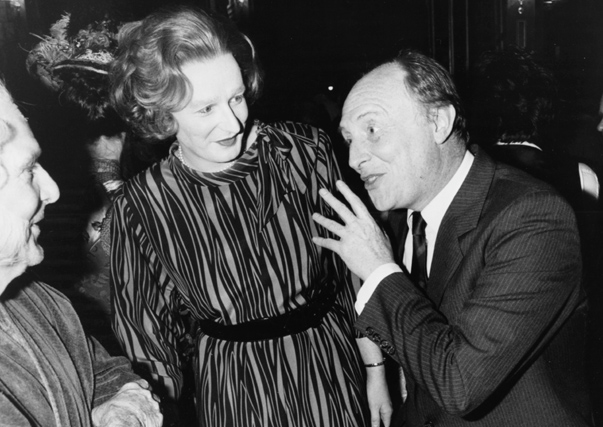“What I do know is the British people will not vote for unilateral disarmament. And that reality has to be dealt with.”
Neil Kinnock, 3 November 2015
Former Labour leader Lord Kinnock has warned Jeremy Corbyn that unilateral nuclear disarmamemnt will not appeal to voters.
Labour are split on the issue of whether to replace the ageing Trident nuclear deterrent with a similar system, or do away with nuclear weapons altogether.
It’s well known that Mr Corbyn wants to go down the disarmament route – although that contradicts the official policy of the UK Labour party.
In Scotland the situation is exactly the other way round. Scottish Labour leader Kezia Dugdale wants to keep Trident, but a resounding majority of delegates at the Scottish party’s conference has voted to scrap it.
Lord Kinnock said: “The debate is wide open. What I do know is the British people will not vote for unilateral disarmament. And that reality has to be dealt with.” Is he right?
The analysis
No doubt Lord Kinnock remembers the days when unilateral nuclear disarmament was official Labour party policy.
Getting rid of nukes formed a key part of the left-leaning 1983 general election manifesto which Labour MP Gerald Kaufman famously dubbed “the longest suicide note in history”. Margaret Thatcher’s Conservatives won an emphatic victory.
Unilateral disarmament was still Labour policy in 1987, when Kinnock led the party to another resounding defeat. A policy U-turn on disarmament followed swiftly.
Was it Trident wot lost it for Labour in the 1980s? It’s hard to say.
But we can say that people were much more concerned about atomic weapons in the 1980s than they are now, according to Ipsos Mori polling.
At the time of the election in June 1983, 30 per cent of people said “nuclear weapons/nuclear war/disarmament” was the most important issue facing Britain. Another 15 per cent chose “defence/foreign affairs/international terrorism”.
By June 1987 21 per cent of people chose the nuclear option as the nation’s biggest worry. And in May this year, around the time of the most recent election, it was just 2 per cent.
This handy chart by the British American Security Information Council (Basic) summarises how Ipsos Mori data shows a huge long-term drop in interest in the nuclear issue since the 1980s:
So it looks like Lord Kinnock could be worrying too much about how much punters care about Trident these days. But is he right to say that they would never vote to scrap it?
The answer is… it depends how you ask.
Over the last ten years, several polls have showed majority support for scrapping Trident.
But it matters how you phrase the question.
In 2005 Greenpeace noted: “Public support for replacing Trident is strongly (if not completely) influenced by the context in which the question is posed.
“If alternative uses for the money are suggested, especially if it could be used to fund additional public services, there is greater opposition to financing Trident’s replacement from the public purse.”
If you mention the £25bn cost of replacing Trident, people are almost always against it, Basic found.
But if, instead of presenting the argument as a straight choice between renewing and scrapping Trident, you offer the third option of a cheaper nuclear deterrent, people tend to favour that option.
Most recently, three YouGov polls, carried out in January, March and April, show a possible hardening of attitude, with the option of replacing Trident with an equally powerful deterrent becoming the most popular choice:
Support for getting rid of nuclear weapons altogether fell to just 19 per cent in the latest poll.
In the long term though, Dr Ben Clements finds evidence of a long-term shift in support for nuclear weapons over the decades since the height of the Cold War on this blog for the LSE.
According to data from the British Election Study, people from across the political spectrum were much more likely to agree with the proposition “Britain should have nothing to do with nuclear weapons” in 1997 than in 1964, though the change was smallest with Conservative supporters.
There are some other key trends that emerge from various surveys.
Supporters of different parties have very different attitudes. Conservatives and, more recently, Ukip supporters tend be much more likely to favour keeping Trident than people who identify with other parties.
And voters in Scotland are consistently more opposed to nuclear weapons than people in England and Wales.
The verdict
Over the long term, there is some evidence of public opinion shifting away from replacing Trident with a like-for-like system, especially if people are told about the likely cost.
If you offer a cheaper option, people are more willing to support an independent UK nuclear deterrent, although people’s feelings depend heavily on their political leanings and which part of the UK they come from.
One very clear trend is that far fewer voters now see nuclear weapons as a big political issue, compared with the 1980s.
Does that mean Mr Corbyn could get unilateral disarmament into the next Labour manifesto without hurting the party’s electoral prospects?
Or has Trident only slipped from voters’ attention because it has been effectively off the political agenda since the late 1980s? We may find out soon.








